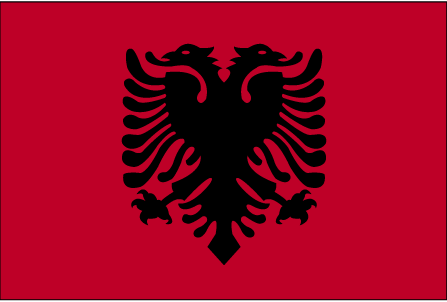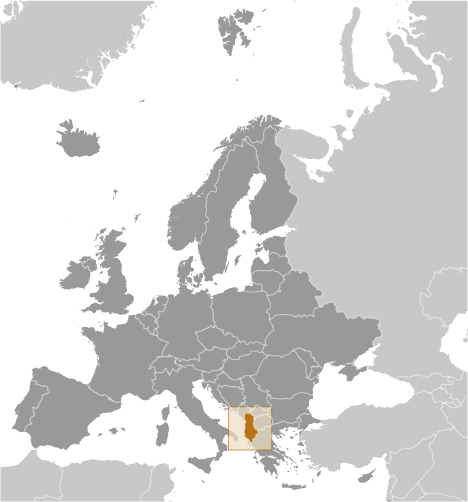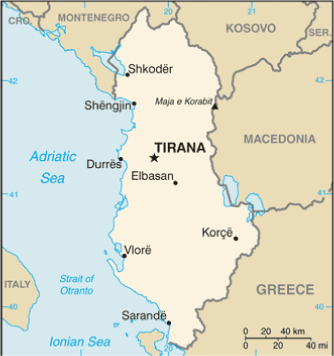Albania declared its independence from the Ottoman Empire in 1912, but was conquered by Italy in 1939. Communist partisans took over the country in 1944. Albania allied itself first with the USSR (until 1960), and then with China (to 1978). In the early 1990s, Albania ended 46 years of xenophobic Communist rule and established a multiparty democracy. The transition has proven challenging as successive governments have tried to deal with high unemployment, widespread corruption, a dilapidated physical infrastructure, powerful organized crime networks, and combative political opponents. Albania has made progress in its democratic development since first holding multiparty elections in 1991, but deficiencies remain. International observers judged elections to be largely free and fair since the restoration of political stability following the collapse of pyramid schemes in 1997; however, there have been claims of electoral fraud in every one of Albania's post-communist elections. In the 2005 general elections, the Democratic Party and its allies won a decisive victory on pledges to reduce crime and corruption, promote economic growth, and decrease the size of government. The election, and particularly the orderly transition of power, was considered an important step forward. Albania joined NATO in April 2009 and is a potential candidate for EU accession. Although Albania's economy continues to grow, the country is still one of the poorest in Europe, hampered by a large informal economy and an inadequate energy and transportation infrastructure.
Population
3,659,616 (July 2010 est.)
Country comparison to the world: 130
Nationality
Noun: Albanian(s)
Adjective: Albanian
Ethnic groups
Albanian 95%, Greek 3%, other 2% (Vlach, Roma (Gypsy), Serb, Macedonian, Bulgarian) (1989 est.)
note:in 1989, other estimates of the Greek population ranged from 1% (official Albanian statistics) to 12% (from a Greek organization)
Religions
Muslim 70%, Albanian Orthodox 20%, Roman Catholic 10%
note: percentages are estimates; there are no available current statistics on religious affiliation; all mosques and churches were closed in 1967 and religious observances prohibited; in November 1990, Albania began allowing private religious practice
Languages
Albanian (official - derived from Tosk dialect), Greek, Vlach, Romani, Slavic dialects
Country Name
Conventional long form: Republic of Albania
Conventional short form:Albania
Local long form:Republika e Shqiperise
Local short form:Shqiperia
Former:People's Socialist Republic of Albania
Government Type
republic
Capital
Name: Tirana (Tirane)
Geographic coordinates:41 19 N, 19 49 E
Time difference:UTC+1 (6 hours ahead of Washington, DC during Standard Time
daylight saving time: +1hr, begins last Sunday in March; ends last Sunday in October
Administrative divisions
12 counties (qarqe, singular - qark); Berat, Diber, Durres, Elbasan, Fier, Gjirokaster, Korce, Kukes, Lezhe, Shkoder, Tirane, Vlore
Independence
28 November 1912 (from the Ottoman Empire)
National Holiday
Independence Day, 28 November (1912)
Constitution
approved by parliament on 21 October 1998; adopted by popular referendum on 22 November 1998; promulgated 28 November 1998
Legal system
has a civil law system; has not accepted compulsory ICJ jurisdiction; has accepted jurisdiction of the International Criminal Court for its citizens
Suffrage
18 years of age; universal
Executive branch
Chief of state: President of the Republic Bamir TOPI (since 24 July 200
Head of government:Prime Minister Sali BERISHA (since 10 September 2005)
Cabinet: Council of Ministers proposed by the prime minister, nominated by the president, and approved by parliament
(For more information visit the World Leaders website)
Elections: president elected by the Assembly for a five-year term (eligible for a second term); four election rounds held between 8 and 20 July 2007 (next election to be held in 2012); prime minister appointed by the president
Election results:Bamir TOPI elected president; Assembly vote, fourth round (three-fifths majority, 84 votes, required): Bamir TOPI 85 votes, Neritan CEKA 5 votes
Legislative branch
unicameral Assembly or Kuvendi (140 seats; 100 members elected by direct popular vote and 40 by proportional vote to serve four-year terms)
Elections:last held on 28 June 2009 (next to be held in 2013)
Election results:percent of vote by party - NA; seats by party - PD 68, PS 64, LSI 4, other 4
note:Parliament in November 2008 approved an electoral reform package that transformed the electoral system from a majority system to a regional proportional system; the code also established an electoral threshold limiting smaller party representation
Judicial branch
Constitutional Court, Supreme Court (chairman is elected by the People's Assembly for a four-year term) and multiple appeals and district courts
Political Parties and Leaders
Agrarian Environmentalist Party or PAA [Lufter XHUVELI]; Christian Democratic Party or PDK [Nard NDOKA]; Communist Party of Albania or PKSH [Hysni MILLOSHI]; Democratic Alliance Party or AD [Neritan CEKA]; Democratic Party or PD [Sali BERISHA]; G99 Political Movement [Erion VELIAJ]; Liberal Union Party or BLD [Arjan STAROVA]; National Front Party (Balli Kombetar) or PBK [Artur ROSHI]; New Democratic Party or PDR [Genc POLLO]; Republican Party or PR [Fatmir MEDIU]; Social Democracy Party of Albania or PDSSh [Paskal MILO]; Social Democratic Party or PSD [Skender GJINUSHI]; Socialist Movement for Integration or LSI [Ilir META]; Socialist Party or PS [Edi RAMA]; Socialist Party 1991 [Petro KOCI]; Union for Human Rights Party or PBDNj [Vangjel DULE]
Political pressure groups and leaders
Citizens Advocacy Office [Kreshnik SPAHIU]; Confederation of Trade Unions of Albania or KSSH [Kastriot MUCO]; Front for Albanian National Unification or FBKSH [Gafur ADILI]; Mjaft Movement; Omonia [Jani JANI]; Union of Independent Trade Unions of Albania or BSPSH [Gezim KALAJA]
International organization participation
BSEC, CE, CEI, EAPC, EBRD, FAO, IAEA, IBRD, ICAO, ICCt, ICRM, IDA, IDB, IFAD, IFC, IFRCS, ILO, IMF, IMO, Interpol, IOC, IOM, IPU, ISO (correspondent), ITU, ITUC, MIGA, MINURCAT, NATO, OIC, OIF, OPCW, OSCE, SECI, UN, UNCTAD, UNESCO, UNIDO, UNWTO, UPU, WCO, WFTU, WHO, WIPO, WMO, WTO
Diplomatic representation in the US
Chief of mission: Ambassador Aleksander SALLABANDA
Chancery: 2100 S Street NW, Washington, DC 20008
Telephone: [1] (202) 223-4942
FAX:[1] (202) 628-7342
Consulate(s) general: New York
Diplomatic representation from the US
Chief of mission:Ambassador John L. WITHERS, II
Embassy: Rruga e Elbasanit, Labinoti #103, Tirana
Mailing address:US Department of State, 9510 Tirana Place, Dulles, VA 20189-9510
Telephone:[355] (4) 2247285
FAX:[355] (4) 2232222
Flag description
red with a black two-headed eagle in the center; the design is claimed to be that of 15th-century hero George Castriota SKANDERBERG, who led a successful uprising against the Turks that resulted in a short-lived independence for some Albanian regions (1443-1478)

















